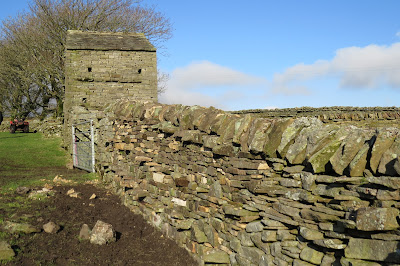The hundreds of miles of dry stone walls that form field boundaries and fell walls
are a fascinating feature of the Yorkshire Dales.
In places, where the gradient of the landscape dictates, the wall appears to climbs endlessly
towards the sky.
The walls are all built in the same way; a double skin with a narrow cavity in the middle where small stone and broken bits are thrown. Generally three levels of 'through stones' or 'truffs' are placed to bridge both sides of the wall. The 'throughs' gives the wall its strength. Finally a tight and tidy row of top stones completes the job.
 |
| Chris recently rebuilt this stretch of wall that leads to a gate. Now tall and straight it will easily stand for another 100 years. |
Like the hundreds of little stone buildings in Swaledale, the walls are all unique. They have special features such as stiles and thru'les or smoot holes. Read about these in a previous blog post https://pryhousefarm.blogspot.com/2019/03/dry-stone-walls.html
Its surprising where an appreciation of the intricacy of these structures can lead. Last year I enrolled on a workshop led by a farmer & dry stone waller from Teesdale. Trevor Dixon established Dalestone Crafts in 1992 and has been making minatures for over 30 years.
I have made two minature walls and a plant pot holder. The walls are constructed in exactly the same way as a proper wall and can include features such as a step stile, gateway, ladder stile or smoot hole
 I wanted to wall into a corner and took my inspiration from this piece of wall in the corner of Pry House home field that has a stepped stile.
I wanted to wall into a corner and took my inspiration from this piece of wall in the corner of Pry House home field that has a stepped stile.
It has been fun making in minature what Chris does for real. My models are lovely but they will never be a shelter from a storm, a place of safety where a yow might choose to lamb, a home for insects, voles and other small mammals or grow green with lichen and moss.
Chris, his brother and his nephew can all wall, a craft that has been handed down through the generations and is an essential skill to keep our walls in good order.





No comments:
Post a Comment